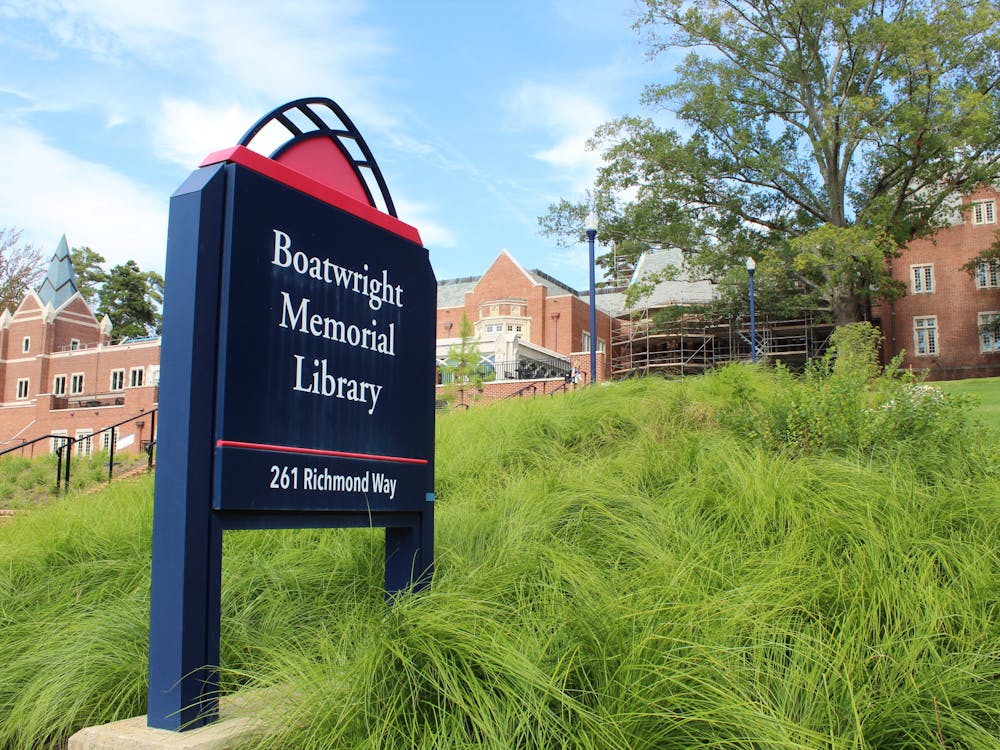Virginia attorney general Robert F. McDonnell addressed students, faculty and staff about how easy it is for him as a Republican to work with a Democratic governor.
McDonnell spoke at a symposium hosted by the University of Richmond Law Review called "Avoiding Constitutional Conflicts in a Divided Executive" at the Jepson Alumni Center last Thursday evening.
About 75 law students, alumni, faculty and lawyers gathered to hear respected constitutional scholars debate the legal repercussions of conflicts between state governors and their attorneys general.
State attorneys general serve in the executive branch as the chief legal advisers to the state government and its various agencies. In Virginia, the attorney general is elected statewide. But in other states, the selection is made by the governor or the state legislature.
McDonnell presented the keynote address. He covered a wide array of topics during his 17-minute speech, from the importance of young people voting to the 400th anniversary of democracy in Virginia. McDonnell talked at length about working with Gov. Timothy M. Kaine, a Democrat.
"I have a great relationship with Governor Kaine," he said. "I give him my best legal opinion, and he can choose to either listen to me or not."
McDonnell said that nothing should be done to resolve the problem of differing opinions on the part of the governor and attorney general, and that bipartisanship was seldom a major issue.
"The biggest problems I've seen between a governor and an attorney general have been between two Democrats," he said.
McConnell did mention several instances where he and Kaine disagreed on policy issues, such as whether to implement legislation about sexual discrimination legislation in the workplace and the possible abolition of the death penalty. But McDonnell said that he and his staff of 230 lawyers, several of them Richmond graduates, were more than capable of running a fluid, productive executive branch alongside the governor.
"[McDonnell's] insight into events that had transpired in the first year in office — the conflicts between he and Governor Kaine — were at the heart of the reason behind the symposium," said Lee Lester, annual survey editor of the University of Richmond Law Review. "His unique perspective was indispensable to our discussion."
The debate segment of the evening featured Michael Signer, an associate at the Washington, D.C., office of Wilmer Cutler Pickering Hale LLP, and William Marshall, a professor of law at the University of North Carolina. Former Virginia Attorney General Richard Cullen served as moderator.
Signer is the author of "Constitutional Crisis in the Commonwealth: Resolving the Conflict Between Governors and Attorney," published by the law review in 2006. The article explains the tension that exists between the governor and the attorney general when the two disagree on matters of policy and law.
Enjoy what you're reading?
Signup for our newsletter
Signer said that in recent years, the power of the attorney general had steadily increased, citing a recent incident where 23 members of the National Association of Attorneys General (NAAG) joined forces to collectively sue the tobacco industry.
"Attorneys general have become much more entrepreneurial," Signer said. "And the governor usually doesn't have a choice but to take the attorney general's advice."
Signer also referred to a recent case in Michigan in which the state attorney general disagreed with the governor about whether to continue the affirmative action program at the University of Michigan. This disagreement resulted in an unfavorable and unproductive political climate in that state and in others with major state universities, which are considered state agencies.
One of Signer's main proposals is the addition of a "governor's counsel" to each of the dozens of state agencies currently under the sole jurisdiction of the attorney general. Under this suggestion, the attorney general's power would be diffused among hundreds of other attorneys and weakened considerably.
Marshall, a former Deputy White House Counsel under President Bill Clinton, disagreed with Signer's analysis of the attorney general's power. The author of "Break Up the Presidency? Governors, State Attorneys General and Lessons from the Divided Executive," refuted Signer's comments in the context of the federal government because "that is where all of the action is, and where it should be."
He said that throughout the United States' political history, the diffusing of executive power through independent executive officials "has been a very successful enterprise," but that the president was still the most powerful figure in that branch of government.
"[The president] can dominate the political agenda just by appearing," Marshall said, adding that "the attorney general's office will be as independent as the president wants it to be."
Marshall proposed making the federal attorney general an independent officer because of the inability of the other branches of the federal government to check the executive's expanding power.
Mohsin Reza, editor-in-chief of the law review, said that the forum was a huge success. "During the Bush presidency, legal scholars and political observers have given an incredible amount of attention to the unitary executive theory, and getting both an academic and political perspective on the controversy made the discussion very interesting," he said.
The law review is the law school's flagship journal, managed exclusively by second- and third-year law students. In addition to publishing one volume that is divided into four issues each year, the law review hosts an annual symposium held on campus.
Support independent student media
You can make a tax-deductible donation by clicking the button below, which takes you to our secure PayPal account. The page is set up to receive contributions in whatever amount you designate. We look forward to using the money we raise to further our mission of providing honest and accurate information to students, faculty, staff, alumni and others in the general public.
Donate Now


